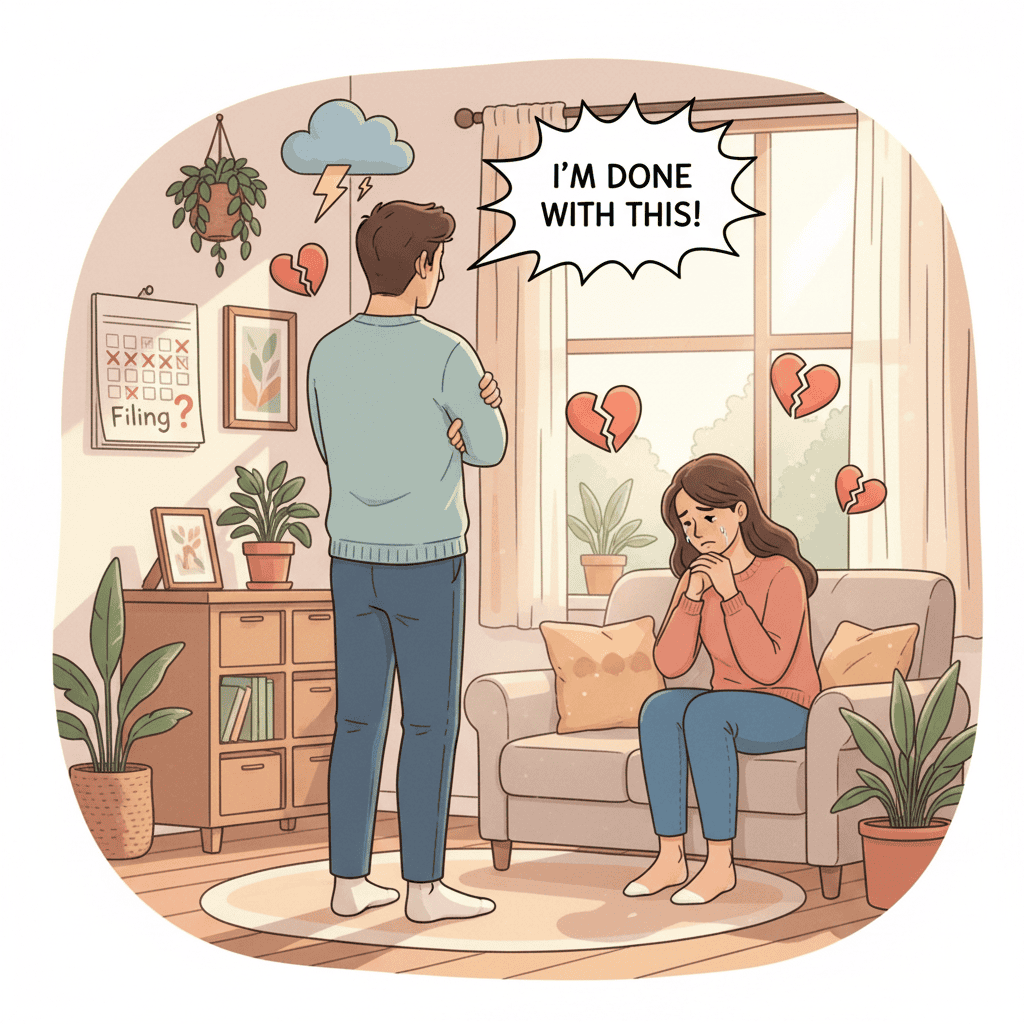Where Every Connection Becomes a Bond

You’ve been married for years, and something shifted. He wasn’t always like this. But over the last few months—or weeks—he’s become hostile, cutting, dismissive. His words sting more than they used to. His behavior feels deliberate, aimed at hurting you.
Then you hear the word: divorce.
You’re left wondering if the meanness was always there, waiting to emerge, or if the thought of ending the marriage somehow triggered this cruelty. The answer is both—and understanding why matters for your next chapter.
1. He’s Testing Whether You’ll Leave
Some men become deliberately mean as a self-protection mechanism.
When a man senses the relationship is ending—or when he’s already decided it—he sometimes accelerates the decline. He becomes meaner so you will file for divorce, leaving him free of the guilt. In his mind, if you’re the one who leaves, he’s not the villain.
He creates an environment so hostile that staying feels unbearable.
This is psychological self-preservation. By pushing you away with meanness, he’s engineering the outcome he already wants while protecting his self-image. He doesn’t have to be the bad guy who abandoned the marriage. You are.
What’s happening: He’s creating an exit strategy that lets him maintain his narrative of who he is.
2. He’s Grieving the Loss and Doesn’t Know How to Process It
Men often express emotional pain through anger instead of vulnerability.
When a man realizes the marriage is truly over, he experiences a loss—not because he suddenly values you, but because his identity is tied to being married. His routines are being dismantled. His family structure is changing. His future, which he’d mentally constructed, no longer exists.
Instead of processing this grief healthily, many men turn it into rage.
Anger feels more powerful than sadness. Rage feels more controllable than loss. So he directs his unprocessed grief toward you in the form of cruelty, criticism, and contempt. You become the target of emotions he can’t name or sit with.
What’s happening: He’s drowning in feelings he refuses to acknowledge, and you’re absorbing the overflow.
3. He’s Justifying His Decision by Finding Your Worst Qualities
Before divorce, men often rewrite the marriage narrative to prove they were right to leave.
When a man is considering divorce, he begins gathering evidence that you’re the problem. He hyper-focuses on your flaws—your tone, your appearance, your habits, your choices. Every irritation becomes proof of incompatibility.
This rewriting allows him to feel justified in leaving.
If you’re inherently flawed (in his mind), then ending the marriage isn’t his failure. It’s the only rational choice. By becoming mean, he’s reinforcing this narrative for both of you and for whatever comes next (the next relationship, his family’s perception, his own conscience).
What’s happening: He’s creating a false history where you were always the problem.
4. He Feels Resentment for Years He’s “Wasted”
Some men view the marriage itself as a mistake, and that realization breeds contempt.
Looking back, he sees wasted years. He wonders what he could have become. He thinks about other women, other opportunities, other lives he didn’t live. And instead of accepting responsibility for his choices, he blames you for keeping him in this marriage.
The resentment festers, and eventually, it erupts.
He becomes mean because, in his mind, you stole years from him. You convinced him to marry you. You kept him bound to this life. Every kind gesture you now make is met with coldness because, from his perspective, your kindness came too late—it came during years he sees as wasted.
What’s happening: He’s punishing you for his own regrets and poor choices.
5. He’s Already Emotionally Detached and Doesn’t Feel Your Pain
When a man has mentally left, emotional empathy often disappears too.
Divorce doesn’t happen in a day. For many men, it happens months or years before he ever mentions the word. Emotionally, he checked out long ago. He made peace with leaving before you even knew he was considering it.
Once that internal decision is made, his psychological distance becomes a chasm.
He stops caring how his words land because, in his mind, you’re already his ex-wife. He doesn’t feel the weight of hurting someone he’s emotionally divorced from. Your tears, your confusion, your pain—they’re not registering the same way they would have before he’d already left you internally.
What’s happening: Emotional abandonment precedes the paperwork.
6. He’s Asserting Control in a Situation Where He Feels Powerless
Some men become mean because divorce makes them feel like they’ve lost power.
If you initiated the divorce or if he fears losing custody, financial stability, or his place in the family—he may lash out through meanness. Cruelty becomes his way of reclaiming control when the legal system, the timeline, and the narrative feel out of his hands.
He weaponizes words because it’s the last tool he has.
Being mean is an assertion of dominance in a situation designed to disempower him. It’s his way of saying, “I still have power over you. I can still hurt you. I can still make this painful.” It’s pathological, but it’s calculated—a desperate grasp at control.
What’s happening: Powerlessness is being converted into aggression.
7. He Has Underlying Anger Issues He Never Addressed
Some men become mean to their wives before divorce because they’ve always been capable of it.
The difference isn’t that he changed—it’s that he stopped managing his behavior because the stakes feel different now. During the marriage, he modulated his meanness. He cared about keeping you. Now that he’s leaving, why bother?
This cruelty was always there.
You may have seen glimpses of it in arguments, in how he spoke about exes, in his criticism of others. But he kept it controlled because maintaining the relationship mattered to him. Once he decides to end it, that filter falls away, and you see the full expression of anger he’s always carried.
What’s happening: You’re seeing his uncensored self because he no longer feels the need to contain it.
Why This Matters for Your Decision
The meanness isn’t a reflection of you or anything you did.
This cruelty is about him—his fears, his grief, his inability to process loss, his choices, his anger. Understanding this distinction is crucial because it protects your own mental health. His meanness is not evidence that you failed at marriage. It’s evidence that he’s handling the end of marriage poorly.
You don’t have to accept it. You don’t have to stay in an environment where you’re being deliberately hurt. You don’t have to wait for him to feel better or process his emotions. You don’t have to absorb his anger and translate it into self-blame.
Document the behavior. Protect yourself emotionally. Set firm boundaries about how you will and won’t be spoken to. If there are children, ensure their exposure to his cruelty is limited.
Most importantly, recognize that you’re not responsible for managing his emotions or his maturity level. The divorce is already happening—whether he’s kind about it or cruel is entirely his choice. Your job now is to protect yourself and move forward.




